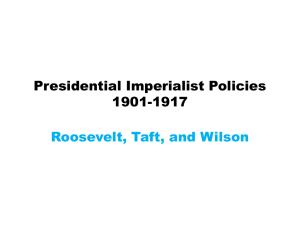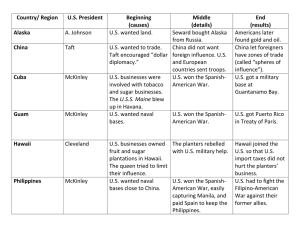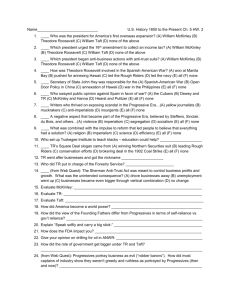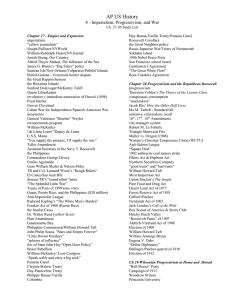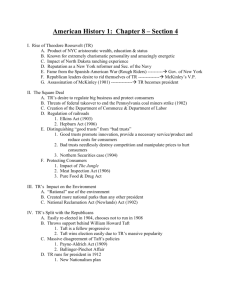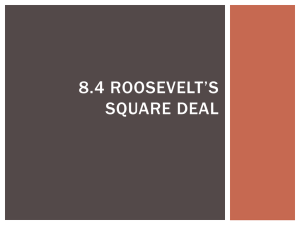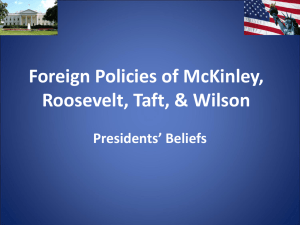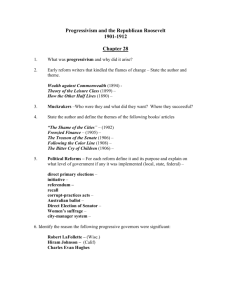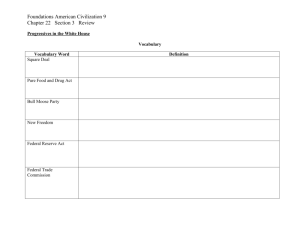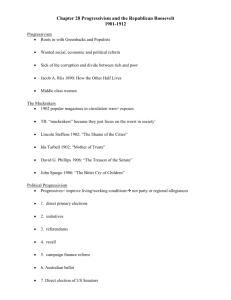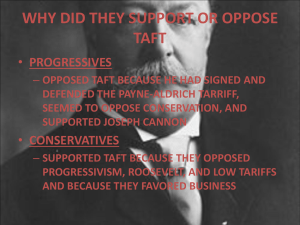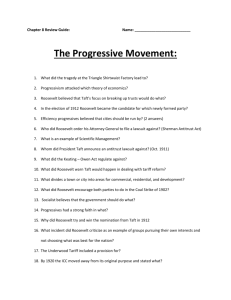Theodore Roosevelt Presidency Chart
advertisement
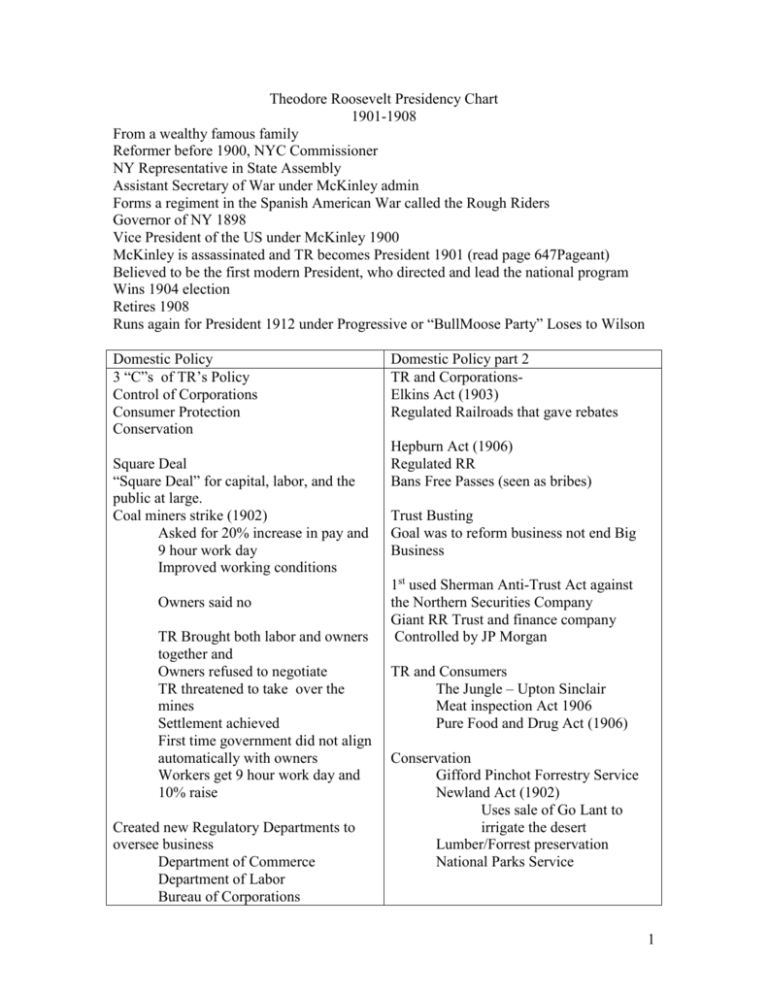
Theodore Roosevelt Presidency Chart 1901-1908 From a wealthy famous family Reformer before 1900, NYC Commissioner NY Representative in State Assembly Assistant Secretary of War under McKinley admin Forms a regiment in the Spanish American War called the Rough Riders Governor of NY 1898 Vice President of the US under McKinley 1900 McKinley is assassinated and TR becomes President 1901 (read page 647Pageant) Believed to be the first modern President, who directed and lead the national program Wins 1904 election Retires 1908 Runs again for President 1912 under Progressive or “BullMoose Party” Loses to Wilson Domestic Policy 3 “C”s of TR’s Policy Control of Corporations Consumer Protection Conservation Square Deal “Square Deal” for capital, labor, and the public at large. Coal miners strike (1902) Asked for 20% increase in pay and 9 hour work day Improved working conditions Owners said no TR Brought both labor and owners together and Owners refused to negotiate TR threatened to take over the mines Settlement achieved First time government did not align automatically with owners Workers get 9 hour work day and 10% raise Created new Regulatory Departments to oversee business Department of Commerce Department of Labor Bureau of Corporations Domestic Policy part 2 TR and CorporationsElkins Act (1903) Regulated Railroads that gave rebates Hepburn Act (1906) Regulated RR Bans Free Passes (seen as bribes) Trust Busting Goal was to reform business not end Big Business 1st used Sherman Anti-Trust Act against the Northern Securities Company Giant RR Trust and finance company Controlled by JP Morgan TR and Consumers The Jungle – Upton Sinclair Meat inspection Act 1906 Pure Food and Drug Act (1906) Conservation Gifford Pinchot Forrestry Service Newland Act (1902) Uses sale of Go Lant to irrigate the desert Lumber/Forrest preservation National Parks Service 1 Theodore Roosevelt Advocated Aggressive foreign policy Election 1912 Taft and TR Split Advocated large Navy after Admiral Taft continued trust busting William T. Mahan’s book, The Influence Brought 90 suits compared to 40 by TR of Sea Power on History Standard oil was beat in a suit Spanish American War starts and TR US Steel was brought 1911 resigns and goes to fight in the war TR became upset because he was Raises and equips a volunteer regiment involved in a merger with US known as the Rough Riders steel. He gains national attention as a war hero Taft allowed tariffs rise (against TR’s desire) Favorite saying relates to his foreign Taft messed up Conservation policy as president Did set up Bureau of Mines “Speak softly and carry a big stick, you Controlled mineral resources will go far.” Coal field conserved Water conserved McKinley is Shot in September 1901 and Problem was the Ballinger-Pinchot Affair TR becomes president at age 42 youngest Sec of Interior Ballinger president to that time. Sold rights to land to developers Pinchot of forestry was upset Panama Canal Taft fired him Strategic, useful in transit TR became upset about this Hay Pauncefote Treaty 1901 gives US the sole right to build a canal on the Isthmus TR starts New Nationalism (1912 Campaign) National Gov Phillippe Bunau-Varilla early French Needs to increase its power to remedy engineer sold his plan to US economic or social abuses Columbia was in control of Panama Columbia would not allow the contract Teams up with LaFollete of Wisconsin to US creates Panama revolt and recognizes run for president on a 3rd party a new Panama country. “The Progressive Party” or “Bull Moose US make treaty with new Panamanian Party” government Hay-Buana-Varilla Treaty Accused Taft of returning back to 1904-1914 $400 million to n complete conservative GOP politics Roosevelt Corollary to the Monroe Doctrine Jane Addams supports TR Mainly financial problems for Latin American countries, islands in the This split the Republican Party Vote and Caribbean and in Central America insures a Wilson (Democratic Victory in prompted TR to issue the Roosevelt 1912) Corollary which said, the US has the right to intervene in the domestic affairs of Foreign Policy Was Assistant Secretary of War under these regions in an effort to maintain their McKinley independence from European intervention. Really seen by Latin American countries as American Imperialism (The Big Stick Policy) 2 Nobel Peace Prize 1906 Russo Japanese war 1904 Japan asked Roosevelt to begin negotiations Treaty of Portsmouth ends the war The Gentleman’s Agreement (Japanese immigration) 1907 Anti-Japanese immigrant feelings cause Americans to desire a change in immigration laws similar to the Chinese Exclusion Act. Japanese Emperor refused to allow new Japanese immigration in exchange for no American Immigration law. Peace and honor secured for both 3
